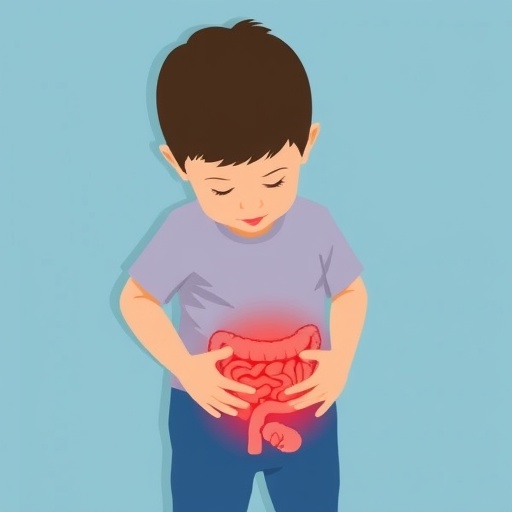Recent research has brought to light a significant association between pediatric constipation and appendicitis, highlighting a pressing concern for parents and healthcare providers alike. Conducted by a team of researchers led by Iwata et al., the study utilizes data from the Japan Environment and Children’s Study, a well-structured birth cohort. The implications of their findings prompt a reevaluation of clinical practices regarding gastrointestinal issues in children and underscore the need for greater awareness of constipation’s long-term effects.
The study spans an extensive demographic, carefully tracking children from birth to assess the prevalence and impact of constipation on appendicitis. Constipation, a common ailment in pediatric populations, often goes overlooked as a serious health issue, leading to dire consequences if left unmanaged. By focusing on these early years of life, Iwata and his colleagues aim to shed light on how chronic constipation might predispose children to appendicitis, a condition that can escalate into a medical emergency.
Interestingly, the methodology employed in this research exemplifies a rigorous approach to data collection and analysis. By engaging a diverse cohort of families, the researchers ensured that a wide range of variables were accounted for, enhancing the validity of their conclusions. This prospective birth cohort study design also allows for the examination of potential causative links, rather than merely associative patterns. The thoroughness of this research underscores the importance of addressing gastrointestinal symptoms in children promptly and effectively.
In a practical context, this study raises the question: how can parents better recognize signs of constipation in their children? Symptoms can range from infrequency and straining during bowel movements to more subtle behavioral indicators such as irritability and disinterest in food. Educating parents about these signs is fundamental to fostering early intervention, and this research supports the narrative that addressing constipation swiftly may mitigate further health complications, such as appendicitis.
The findings offer a wake-up call for pediatricians and caregivers alike. As gastrointestinal health becomes increasingly recognized as integral to childhood development, the link between constipation and appendicitis cannot be ignored. The prospect of a more holistic approach to pediatric health care is an exciting development, advocating preventive measures rather than reactive treatments when complications arise. Moreover, the exploration of this connection fosters a greater understanding of the interrelatedness of bodily systems, particularly in developing children.
Compounding this issue is the growing concern about dietary habits among children. Many children’s diets are deficient in fiber, which is crucial for maintaining healthy bowel movements. As more children embrace processed foods and sugary snacks, the incidence of constipation is likely to rise, potentially increasing the risk of conditions such as appendicitis. Awareness campaigns aimed at improving dietary choices can play a vital role in reducing this incidence, advocating for increased intake of fruits, vegetables, and whole grains among young populations.
Importantly, this research also emphasizes the need for further studies to explore the underlying mechanisms connecting constipation and appendicitis. While the association is evident, understanding the biological and physiological pathways that facilitate this link will be crucial for developing targeted prevention strategies. This aspect of research could lead to innovative interventions that alleviate symptoms of constipation before they escalate into something more severe.
On an academic level, the discussions prompted by this study may inspire future research endeavors to explore other potentially related conditions within pediatric health. The breadth of the implications detected by Iwata and colleagues suggests that a multifaceted approach to children’s health could yield compelling findings across various health domains. These explorations could ultimately lead to policy changes in pediatric healthcare guidelines, emphasizing the need for comprehensive gastrointestinal wellness checks during childhood.
As the conversation around this topic develops, it could also reshape how educational institutions approach teaching children about health and nutrition. By integrating lessons on the importance of digestive health into school curriculums, children might develop better habits from a young age, potentially sparing future generations from both constipation and its fallouts, including appendicitis.
Finally, the need for public health awareness campaigns cannot be eschewed. As the connection between pediatric constipation and appendicitis becomes more widely understood, efforts must be made to educate communities on prevention strategies and treatment options. By fostering a culture of awareness surrounding gastrointestinal health, a collective stride toward enhanced child welfare may be achieved.
In conclusion, Iwata et al.’s study marks an important milestone in pediatric health research, firmly establishing a link between constipation and appendicitis. The findings call for immediate action from parents, healthcare providers, and educational institutions to encourage early detection and proactive management of gastrointestinal issues. As awareness grows, so too will the potential for improved health outcomes in children, alleviating both immediate and long-term complications.
Subject of Research: The impact of pediatric constipation on appendicitis
Article Title: The impact of pediatric constipation on appendicitis: a prospective birth cohort in the Japan Environment and Children’s Study
Article References:
Iwata, H., Yamaguchi, T., Itoh, S. et al. The impact of pediatric constipation on appendicitis: a prospective birth cohort in the Japan Environment and Children’s Study.
BMC Pediatr 25, 962 (2025). https://doi.org/10.1186/s12887-025-06263-7
Image Credits: AI Generated
DOI: https://doi.org/10.1186/s12887-025-06263-7
Keywords: Pediatric constipation, appendicitis, gastrointestinal health, childhood development, nutrition, public health awareness




